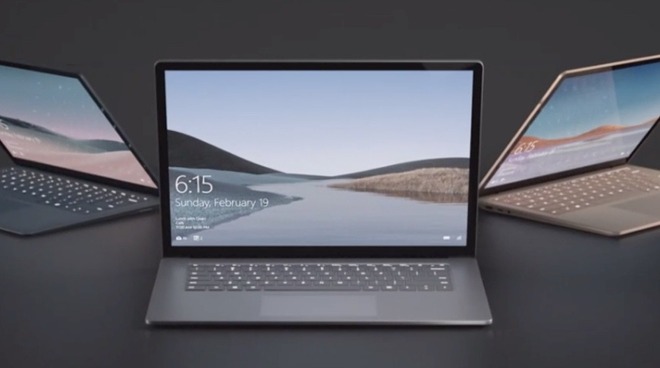Microsoft may follow Apple in creating own chips for Surface notebooks
Microsoft may go down the same route as Apple in shifting away from Intel for its products, with the software giant said to be working on its own processor designs that may end up in its Surface computer line.

Apple's self-designed A-series chips used in the iPhone and iPad lineup, as well as the new Apple Silicon for Macs, has demonstrated it is possible for a hardware producer to create its own processor instead of relying on a third party like Qualcomm or Intel. Rumors from Microsoft suggest it too may pull off the same hardware maneuver in the future.
According to sources of Bloomberg, Microsoft is working on an in-house processor design, one that could be used in its Surface lineup, but may also end up in servers. Thought to be ARM-based, the chip design unit is said to report to Jason Zander, the head of Microsoft's Azure cloud business.
Fueling the effort is Microsoft's increase in hiring processor engineers over the last few years, including some from Qualcomm's abandoned server chip efforts, as well as from the same hiring pool used by Intel, AMD, and Nvidia.
"Because silicon is a foundational building block for technology, we're continuing to invest in our own capabilities in areas like design, manufacturing, and tools, while also fostering and strengthening partnerships with a wide range of chip providers," said Microsoft spokesman Frank Shaw.
If true, this would be a continuation of form for Microsoft, which has previously employed ARM chips from Qualcomm in some variants of Surface notebooks. It also has experience with ARM from its ill-fated Windows Mobile initiative.

Apple's self-designed A-series chips used in the iPhone and iPad lineup, as well as the new Apple Silicon for Macs, has demonstrated it is possible for a hardware producer to create its own processor instead of relying on a third party like Qualcomm or Intel. Rumors from Microsoft suggest it too may pull off the same hardware maneuver in the future.
According to sources of Bloomberg, Microsoft is working on an in-house processor design, one that could be used in its Surface lineup, but may also end up in servers. Thought to be ARM-based, the chip design unit is said to report to Jason Zander, the head of Microsoft's Azure cloud business.
Fueling the effort is Microsoft's increase in hiring processor engineers over the last few years, including some from Qualcomm's abandoned server chip efforts, as well as from the same hiring pool used by Intel, AMD, and Nvidia.
"Because silicon is a foundational building block for technology, we're continuing to invest in our own capabilities in areas like design, manufacturing, and tools, while also fostering and strengthening partnerships with a wide range of chip providers," said Microsoft spokesman Frank Shaw.
If true, this would be a continuation of form for Microsoft, which has previously employed ARM chips from Qualcomm in some variants of Surface notebooks. It also has experience with ARM from its ill-fated Windows Mobile initiative.

Comments
And I don't get why you think it's ridiculous to copy good ideas. Was Apple ridiculous when copied MS with the Pencil, keyboard + trackpads, FaceID and multitasking in tablet mode to iPads?
Sometimes good ideas are worth to follow, as when Apple followed MS in iPads with the Pencil, keyboard + trackpads, FaceID and multitasking in touch UI.
The "crappy software company" have one of the largest cloud infrastructures in the world, and it's clear they will benefit by moving to their own ARM chips. I see no reason to think the knowledge and experience they'll have in their datacenter will influence and benefit in many ways the development of ARM for their devices. Different from you, I could see them succeed in the transition. What option do they have? Wait for Intel?
First paragraph in the bloomberg article:
Microsoft is going the ARM route for servers (Azure), similar to their largest competitor Amazon. AWS has already been using Amazon's own second generation ARM Graviton2 processors which, as Amazon claims, offers customers 40% better price performance than x86 based instances. A third generation Graviton3 (likely based on Neoverse V1 or Neoverse N2) is expected in 2021.
Seriously, this isn't all about Apple all the time.
Can you be more specific how MS locks you into their environment? I'm seeing MS supporting more platforms than before, but maybe I'm missing something.
@ home but I still have Windows7 desktop for an old pc program that i used at least once a month....Wintel Is not going anywhere for a while.
Can someone name one original idea from Microsoft?